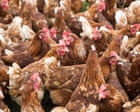A trade deal with Gulf states could severely undermine British farmers by allowing the importation of low-welfare meat, the National Farmers’ Union has said in a letter to the prime minister.
The UK is close to signing a £1.6bn trade agreement with Gulf states – Bahrain, Kuwait, Oman, Qatar, Saudi Arabia and the United Arab Emirates – amid deep dissatisfaction from farming and animal welfare groups over an expected deal for food imports.
Human rights groups have also criticised the proposed deal for making no concrete provisions on workers’ rights, modern slavery or the environment.
Last week, the business secretary, Jonathan Reynolds, said there would be “chapters in that agreement” on human rights that were not legally binding. “You don’t have that in trade deals, but it’s important you have that ethos and that approach reflected,” he said.
Farmers’ groups have told the prime minister, Keir Starmer, that the deal with the Gulf Cooperation Council would go against a commitment he made at the National Farmers’ Union (NFU) conference to protect high welfare standards, saying that the way most poultry is produced in Gulf states would be illegal in the UK.
The Guardian hasreported previouslythat the deal included uncapped access to the UK’s poultry market for chicken meat if imports meet UK hygiene standards. However, meeting these checks does not mean meeting UK animal welfare standards.
The NFU president, Tom Bradshaw, said: “Balanced and mutually beneficial trade deals can provide a real economic boost, including for farm businesses. A modern trade deal with the GCC, if fair and balanced, could offer huge potential for agricultural exporters.
“But, as always, this balance depends on the government upholding its commitments to not allow greater market access for food imports which have been produced in ways that are illegal here. This would undermine Britain’s reputation for high animal welfare standards that our producers deliver, and consumers value and rightly expect.”
He said the trading bloc “only seems to have basic welfare provisions, which fall well short of the robust species-specific legislation in place in the UK”.
“It’s vital the government takes the same balanced approach it took with the recent India and US trade agreements. This is the next test to see if the government will stand strong and protect the standards our country demands and values,” he added.
Farmers have minimum standards to reach in terms of space for birds to live in, and there is mandatory pre-slaughter stunning in most cases.
In the six Gulf countries involved in the deal, poultry must be slaughtered according to halal principles, though stunning is sometimes used. Poultry is often raised in intensive indoor systems, especially given the region’s harsh heat.
The UK has some of the strictest standards for chicken space in the world. Poultry farmers must give their flock a minimum of 750 sq cm of space per bird, and 600 sq cm must be usable.
The deal, led by the trade minister, Douglas Alexander, is likely to be particularly beneficial for the car industry and financial services, though estimates suggest a free trade agreement would be worth less than 1% of GDP by 2035.
Trade with the six-member bloc is worth about £59bn a year, according to UK government estimates, as the UK’s seventh-largest export market, with a trade deal expected to increase trade by about 16%.
